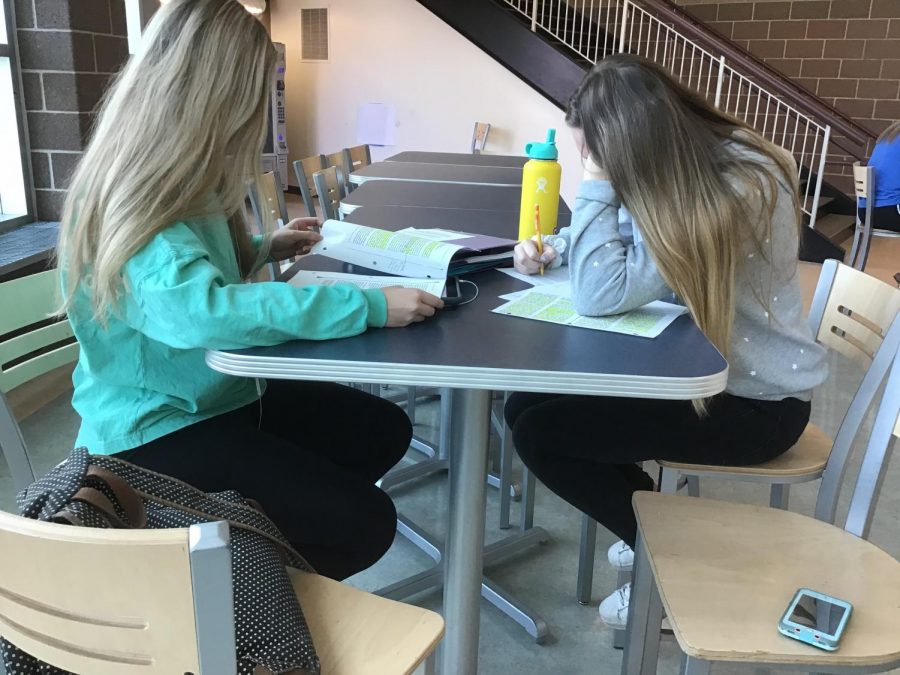Drowning in the stress of high school: how one adjustment in homework might be the change we need
Some students feel overwhelmed. Here’s one student’s perspective on how we might fix this.
MHS students working on homework during an off block
November 5, 2018
We hear it all every day: there’s not enough time. In the life of a high school student, it is undoubtedly true. We have a seven hour school day, sports, jobs, and homework that consume all our time. With all this, when is there time for a social life and a good night’s sleep? According to the National Sleep Foundation, teenagers need between eight and ten hours of sleep a night. Many students at Mead are not meeting this.
Junior Trevin Haines says he gets four to five hours of sleep a night. When asked why this is, he says it’s the overwhelming amount of stress he feels every night between homework, grades, extracurricular activities, and of course the social stress of high school.
Of course, there’s no way to completely eliminate all high school stress. That being said, there are ways we can take the load off of students and at least reduce the stress to a manageable level.
As a student, there are two different types of homework we get assigned. One is work we were given in class that simply didn’t get done that becomes homework. The other kind is added homework. Just as it sounds, added homework is an extra assignment, specifically to do at home.
If we eliminate added homework, it would eliminate an enormous amount of stress. It would also allow more time for students to focus on keeping themselves healthy, extracurriculars that are strongly encouraged by the school, and spending time with their family.
What does an average day look like?
I asked one student from each grade about their average day and here is what they expressed when asked about homework, sleep, stress, extracurricular, and grades.
Senior Dani Garcia is an excellent student. She recently won an award in softball for her academics. She spends an average of two to three hours a night on homework. She gets five to six hours of sleep a night. When I asked her if her homework impacts how much sleep she gets she said, “Yeah, the other night I stayed up ‘til midnight doing homework.”
Haines commented, “At this point, I’m depleted of energy and motivation.” This is due to the unhealthy amount of stress from the three to four hours of homework he has a night on top of hours upon hours he spends in his extra curricular activities. This leaves him not getting anywhere near enough sleep at night; as a result he is on an endless cycle of stress and exhaustion.
How are students supposed to reach the expectations our administrators, teachers, and parents have set under these conditions?
Freshman Khyra Brockbank is a positive, hard working student who spends two to three hours a night on homework. Brockbank is a straight A student taking mostly honors classes. She is also an athlete and spends an average of two hours at softball. Between school, homework, and sports, she states that she often comes to school tired and under rested. This also doesn’t leave much time for social activities and just any sort of fun.
Sophomore Madi Nagy is a high-striving student athlete who also has a job. She has a lot on her plate. She spends three to four hours a night on homework. In addition, she spends six to seven hours at work and/or sports. She says she usually gets six to seven hours of sleep a night and explains her amount of homework has an impact on her sleep. She remarked, “The more homework I get, definitely the less sleep I get, and the less quality sleep I get.” With all of this going on in her life, Nagy rated her stress level a 7.5/10 on an average day.
Students in general shouldn’t be sacrificing their physical and emotional health for their school work.
We need to make a change. There needs to a new policy to manage students workload at home.
When interviewing fellow peers they all express that there homework is usually additional work, as opposed to unfinished class work.
When asked about this Nagy says, “Nine out of ten times it’s definitely just homework, like it’s something that’s separately assigned; if I don’t finish something in class that’s also homework.”
Many are in agreement. Stress levels would be reduced if there wasn’t any extra work assigned. Students will perform better in school after being well rested. Our high school experience will likely become more enjoyable. All of this is possible with one simple change.
Teachers should not assign extra homework. By this I mean that if students receive homework, it should be unfinished classwork, not an additional assignment.
Students and adults can agree they want similar things: happy, healthy, and successful students, and the most obvious way to do this is reduce their stressors and decrease the amount of homework they are given. If you want students to strive, give them an environment to do so.




Jocelyn Zavala • Jan 24, 2020 at 11:03 am
It nice to see someone speaking up about this.
Arizona Lee • Sep 9, 2019 at 8:51 am
This is awesome! I especially liked the “what does an average day look like” section.
Rebecca • Aug 30, 2019 at 10:58 am
This is a great article. Thank you!
Jordan Baumgartner • Aug 30, 2019 at 10:54 am
Really helpful article!
Matthew Silbernagel • Nov 18, 2018 at 11:48 pm
Great article!!
william M farr • Nov 6, 2018 at 8:28 am
Good job hannah well thought out
Madi Nagy • Nov 5, 2018 at 1:34 pm
Nice article!